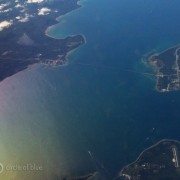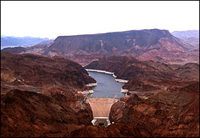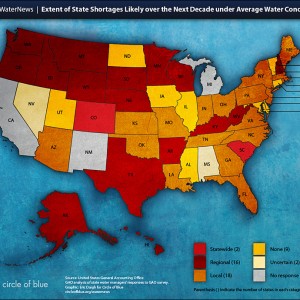Q&A: James Olson on Great Lakes Compact, Water Privatization

In an interview with Circle of Blue, James M. Olson discusses the Great Lakes Compact: an international agreement intended to protect the Great Lakes Basin. Olson, an environmental lawyer specializing in natural resource law, highlights the possible unexpected consequences of the Compact. He is the senior principal at the law firm Olson, Bzdok & Howard.
What is the Great Lakes Compact designed to do?
The Great Lakes Compact was designed to prevent diversions of water outside of the Great Lakes Basin, and to impose consumptive use limits within the Basin. That is, manufacturing use of water in various products, or as a medium of carrying products.
It became apparent that impact standards weren’t very good for diversion bans because some diversions may or may not cause impact. If you divert water out of Lake Superior it may not show up as more than a drop of an inch or two. Some might say that’s not a significant impact, so it resulted in the current version of the Compact. That version does not say “no diversions,” it says no “bulk diversions,” diversions being pipelines, or ships — any kind of conduit, or carrier of water outside of the basin.
In the time after the compromise was realized with the proposed Compact language, it was noticed that there was a product exemption. There was language in there about water produced and shipped outside of the basin as a product. That’s a broad definition and it was then a concern of many that water in any size container with a label “product” would be exempt from the diversion ban, so there were some cries and at the last minute there was this bulk diversion provision that said anything more than 5.7 gallons would be treated as a diversion, and therefore only small containers could go outside the basin — i.e. bottled water.
What concerns do you have with the Compact?
There are three major concerns that I have with the Compact. One is that there is a huge product exemption; a precedent is being set that water can be privatized for export and sale. It is not subject to the diversion ban and Compact, which could tilt the gradient of Great Lakes water to the West, or to the Southeast, or anywhere in the world if it was in a container. It wasn’t intended to turn water into a private commodity, or to privatize water and there’s a huge risk that the Compact does exactly that.
The other big issue is that the Great Lakes and all navigable water are by U.S. and State Supreme Court decision since the late 1800’s subject to public ownership in a public trust, which demands that governments not dispose of water for private gain and purposes. It demands that water be managed for the benefit of all citizens so it can be used for commerce, navigation, farming, and the likes and maintained for the benefit of the poorest of us, not just for the advantaged. The doctrine is a democratic doctrine that assures things like water that are common are not controlled by private interests, and that’s exactly what could happen with the Compact. It’s strange that the Compact does not include a public trust standard, which is the most basic, and the highest ethical standard, or stewardship standard recognized by law, by the US Supreme Court, and by the states of the Great Lakes.
The last problem is that some of the states are adopting the Compact’s diversion ban, but they’re not enacting conservation standards that are very strict. Michigan is just about to pass this water law that you’ve been reading about; they’re going to allow water to be allocated for privates use: up to 25 percent of the lakes and streams. This means all the groundwater that feeds lakes and streams can be removed until you have fish kill of 5 to 20 percent. That’s a huge amount of water, I mean it’s the equivalent of a quarter of the Ogallala aquifer, which is about the size of Lake Huron.
It’s not that there aren’t good things in the Compact like the diversion ban, it’s there. It’s that it could be whittled away. We’re talking about legal barriers that could be removed more easily because of the way the Compact is not written, which if they were removed would lead towards the larger, quantifiable problems.
What kind of event is going to trigger a more vigorous response to Great Lakes water protection?
I think it will take another event like the pipelines that were proposed in the 1980’s, or somebody on the Federal level will want to test the Compact because they have some private interest, or interests of states in other parts of the U.S. that want to outdo it, or position themselves to take advantage of the holes that are in it.
Are some of these holes big enough for a straw to poke through?
The holes are as follows: without public trust assertions, the first hole is that you’re heading down a slippery slope that water can be treated as a private commodity. If you expand the right for people to extract it because you’re not recognizing the public trust in water, then the limitation on selfish exploitation is removed, and that slippery slope is a pretty big hole.
Is it quantifiable? Well, no because it’s a precedential principle. The same is true of the product exemption: how do you quantify it? Someone told me, it’s not a pipeline, it’s containers — well, how cost effective is it to put large containers onto railroad cars with the word “product” on them?
It depends on how desperate other points on the map become for water, and if they’re willing to pay for it. Will that drain 30 percent of the Great Lakes water? Not immediately. I think we’re talking about a gradual, long term shift from public to private with this pull, but in the long term, it could be 30 percent.
There’s a fellow in South Carolina who has the idea of shipping water around the world and believes that the demand is almost there. Climate change and localized crises could very well create the market for water in the near future. Do we say it’s far enough away that we don’t have to do anything? Do we wait until the parachute still hasn’t opened and we’re a 1000 feet from the ground? That’s the real question here.
Interview by J. Carl Ganter and Aaron Jaffe for Circle of Blue, June 25, 2008
Circle of Blue provides relevant, reliable, and actionable on-the-ground information about the world’s resource crises.










Hi. I am a content writer and I work for a publication on Water, India. I would like to get in touch with Mr. James M. Olson, his views are quite inspiring and I would like to have more information on the same. Kindly direct me to him.
Mariayn,
The best way to get a hold of him is through is website, which can be found here: http://www.envlaw.com/profiles/olson.html
Cheers,
Cody